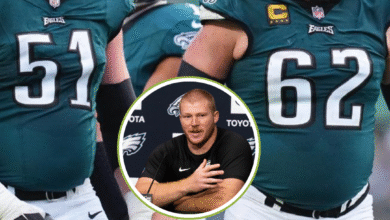‘He May Be the Greatest Ever’—Why Brett Favre Thinks Rodgers Surpassed Even Brady
OPINION: This article may contain commentary which reflects the author's opinion.
In the pantheon of NFL quarterbacks, few names resonate as powerfully as Tom Brady and Aaron Rodgers. Brady, with his seven Super Bowl rings and unparalleled longevity, is often hailed as the greatest of all time (GOAT). However, Hall of Fame quarterback Brett Favre recently stirred the debate by proclaiming that Aaron Rodgers might just be “the greatest ever,” potentially surpassing even Brady. This bold statement from Favre, a legend in his own right, merits a closer look at why he holds Rodgers in such high esteem.
Favre’s admiration for Rodgers is rooted in a unique perspective. As Rodgers’ predecessor with the Green Bay Packers, Favre witnessed the young quarterback’s development firsthand. Rodgers served as Favre’s backup for three seasons before taking over in 2008, giving Favre an intimate view of Rodgers’ work ethic, intelligence, and raw talent. This personal connection likely informs Favre’s high praise, but his argument extends beyond sentimentality to tangible aspects of Rodgers’ game that set him apart.
One of the primary reasons Favre elevates Rodgers is his extraordinary efficiency and precision. Rodgers has consistently posted some of the NFL’s best statistical performances, including a career passer rating that ranks among the highest in history. His touchdown-to-interception ratio is staggering—through the 2024 season, Rodgers has thrown 510 touchdowns against just 103 interceptions, a testament to his ability to make smart, high-impact plays while minimizing mistakes. Favre has highlighted Rodgers’ knack for delivering pinpoint passes under pressure, often describing his throws as “surgical.” This precision, Favre argues, gives Rodgers an edge in situations where Brady, though clutch, sometimes relied on his team’s overall system.

Rodgers’ athleticism and improvisational skills also factor heavily into Favre’s assessment. While Brady is renowned for his pocket presence and quick decision-making, Rodgers combines those traits with remarkable mobility and creativity. His ability to extend plays with his legs, evade defenders, and make off-platform throws has produced some of the most memorable moments in NFL history. Favre, known for his own gunslinger mentality, likely sees a kindred spirit in Rodgers’ willingness to take risks and turn broken plays into game-changing moments. This dynamic playmaking ability, Favre contends, makes Rodgers a more versatile quarterback than Brady, who thrived within a structured offense.
Another point in Rodgers’ favor, according to Favre, is his ability to elevate lesser supporting casts. While Brady benefited from playing under Bill Belichick and alongside talented rosters, Rodgers has often worked with less star power, particularly in his later years with the Packers. Despite this, he has consistently led Green Bay to playoff contention, earning four NFL MVP awards (2011, 2014, 2020, 2021)—more than Brady’s three. Favre points to Rodgers’ 2020 and 2021 seasons, where he orchestrated elite offenses with a revolving door of receivers, as evidence of his ability to carry a team. This resilience and adaptability, Favre argues, showcase Rodgers’ greatness in a way that Brady’s system-dependent success sometimes overshadows.
However, Favre’s claim isn’t without controversy. Brady’s proponents argue that his seven Super Bowl victories and sustained excellence into his mid-40s set an unmatched standard. Rodgers, with only one Super Bowl win (2010), lacks the championship pedigree that defines Brady’s legacy. Critics also note that Brady’s ability to win with multiple teams, including his 2020 Super Bowl with the Tampa Bay Buccaneers, demonstrates a level of adaptability that Rodgers has yet to match. Favre acknowledges these points but counters that Rodgers’ individual brilliance and statistical dominance make a compelling case, even if team success hasn’t always followed.
The debate also touches on intangibles. Rodgers’ cerebral approach—his ability to read defenses, audible at the line, and exploit mismatches—has earned him praise as one of the game’s smartest quarterbacks. Favre often cites Rodgers’ “feel” for the game, an almost instinctive ability to sense pressure and manipulate defenses. While Brady’s preparation and discipline are legendary, Rodgers’ blend of instinct and intellect gives him a unique edge in Favre’s eyes.
Ultimately, Favre’s assertion that Rodgers might be the greatest ever reflects a deep appreciation for his successor’s singular talents. While Brady’s resume is undeniably formidable, Rodgers’ combination of efficiency, athleticism, and improvisational brilliance makes him a worthy contender in the GOAT conversation. Favre’s perspective, shaped by his own storied career and close ties to Rodgers, underscores the subjective nature of such debates. For now, fans and analysts can only marvel at the legacies of both quarterbacks, each great in their own right.



